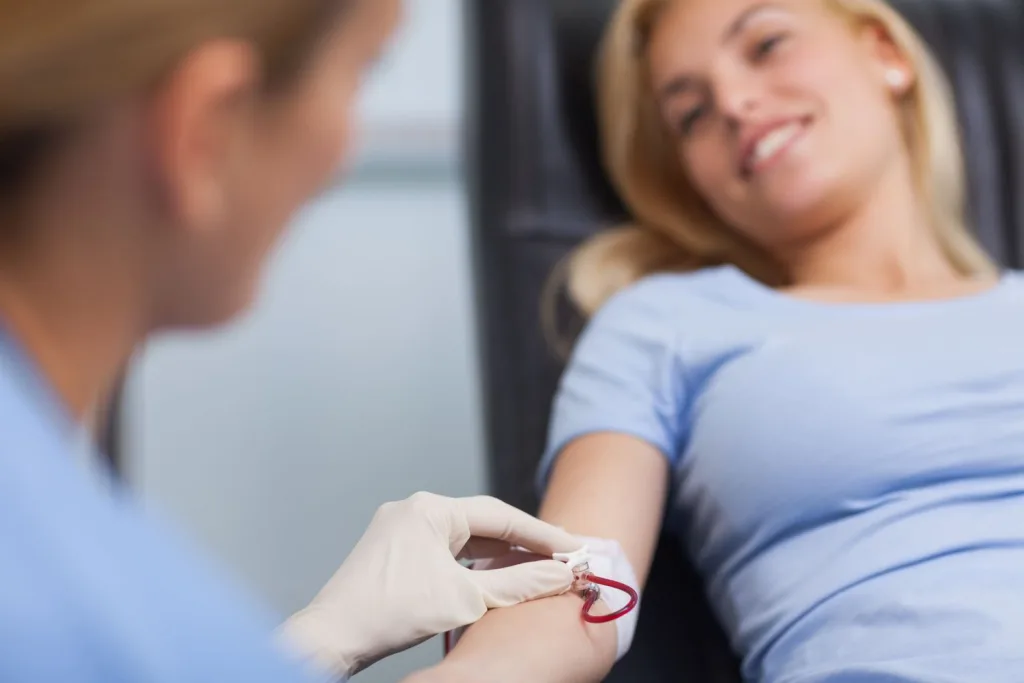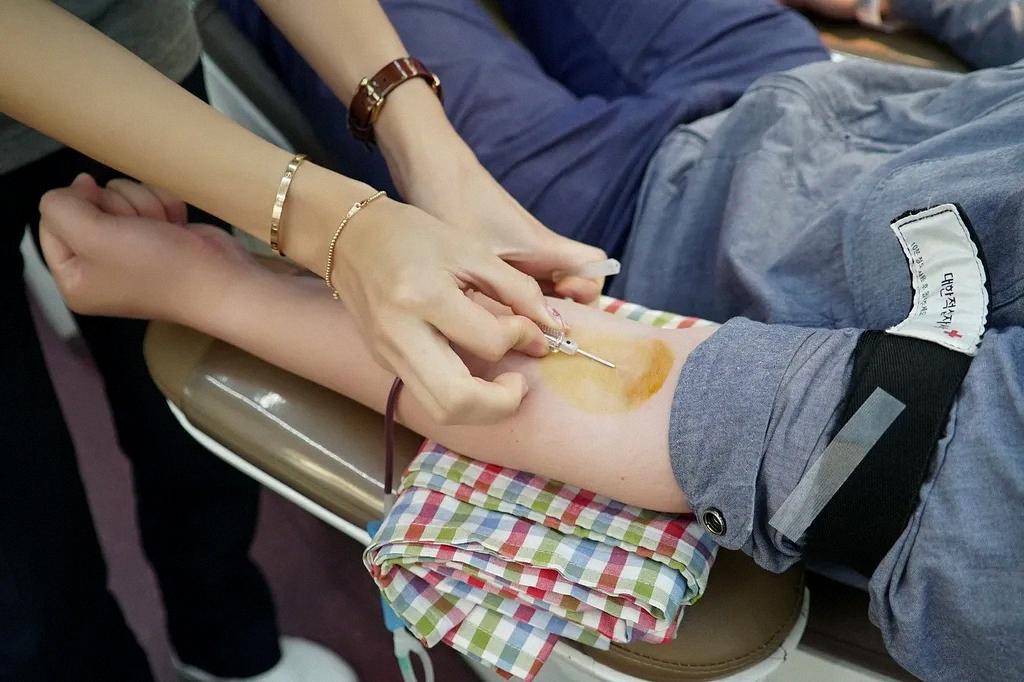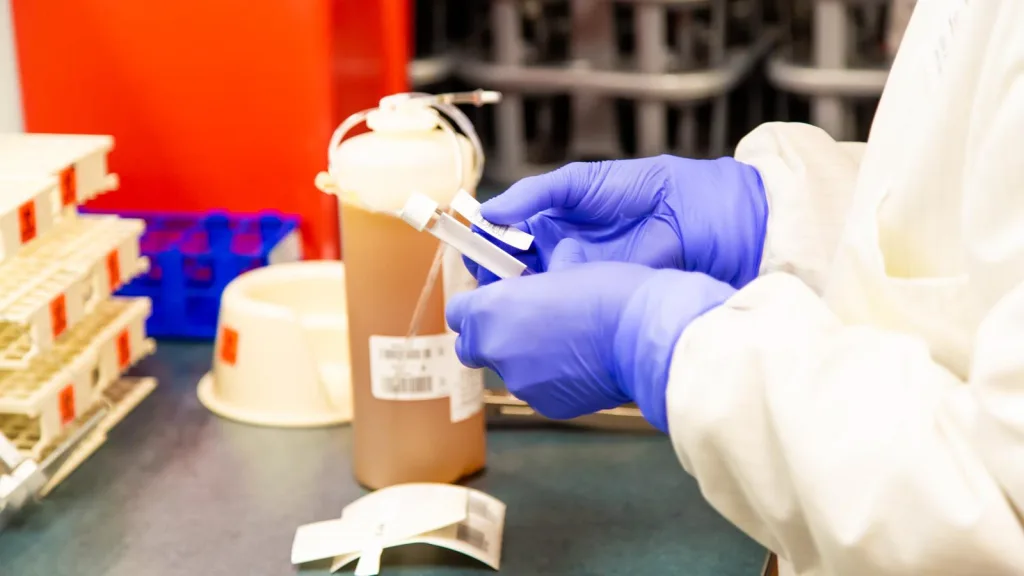Are you a breastfeeding parent wondering if it’s safe to donate plasma? The answer is yes, but with a few caveats.
While breastfeeding mothers are generally allowed to donate blood after six weeks postpartum, the same isn’t necessarily true for donating plasma. Plasma donation centers may have stricter guidelines because of the potential for Human Leukocyte Antibodies (HLA) in the plasma of pregnant and postpartum women. While HLA don’t cuse harm to the donor, they can be harmful to recipients of donated plasma or platelets.
For this reason, the American Red Cross and Canadian Blood Services both recommend that pregnant and postpartum women wait until they are six months postpartum before donating plasma. It is important to note that if you have had a cesarean section delivery, you may need to wait longer before donating as well.
It is also important to discuss any plans to donate plasma with your healthcare provider beforehand. Generally, providers will advise against donation if you are anemic or have low iron levels due to breastfeeding. Low iron levels can reduce your red blood cell count which would disqualify you from donating.
Additionally, it’s important not to skip meals or exercise excessively before donating plasma as this can also affect your red blood cell count and disqualify you from donation. If you feel unwell or have recently been exposed to an illness before donating, it’s best not to donate until symptoms have subsided or a doctor has cleared you for donation again.
Overall, it is safe for breastfeeding mothers to donate plasma after six months postpartum as long as their health provider approves and their red blood cell count is within acceptable levels for donation.
Donating Plasma After Breastfeeding
The recommended waiting period for donating plasma after breastfeeding varies from country to country. In the United States, the American Red Cross recommends that women wait six weeks after giving birth before donating plasma. The Canadian Blood Services and the National Health Service in the UK suggest waiting until you are six months postpartum before donating.
Before making a decision to donate plasma, it is important to speak with your doctor and get their opinion on when would be the best time for you to donate given your individual health circumstances. Your doctor can also provide you with any other helpful advice rgarding your particular situation.

Requirements for Donating Plasma After Pregnancy
Due to the increased needs of a pregnant woman’s body, donating plasma duing pregnancy and for the six months following can be potentially dangerous. During pregnancy, the body requires higher levels of iron and red blood cells to support the fetus. This could leave a new mother with dangerously low levels of iron and red blood cells if she were to donate plasma during this time.
In addition, a new mother’s body needs time to regain strength after giving birth. A six month waiting period after delivery is recommended in order to give the body time to fully recover. Donating plasma too soon may further deplete her iron stores and put her at risk for developing anemia or other health problems.
For these reasons, it is important for a woman to wait until she has been postpartum for at least six months before donating plasma in order to ensure that her own health is not compromised by doing so.
Risks of Donating Plasma After Having a Baby
Having a baby can produce Human Leukocyte Antibodies (HLA) in the mother’s body, which can be harmful to the recipient of donated platelets or plasma. HLA is an antibody that recognizes foreign substances and can cause destruction of these blood cells if they are transfused into another person. Because of this, women who have been pregnant are not allowed to donate plasma after havig a baby.
This precaution helps to ensure that the donated plasma or platelets are safe for recipients, while also protecting the mother from any potential risks associated with donating her own blood. Additionally, women may experience fatigue and other health issues after childbirth which could prevent them from providing healthy plasma or platelets. For all these reasons, it is important that women wait at least six months before donating their blood after giving birth.
Donating Blood While Breastfeeding
Yes, it is possible for breastfeeding mothers to donate blood. However, it is important to wait untl they are released from their doctor’s care, which is typically six to eight weeks postpartum. This allows the mother’s body enough time to recover from childbirth before attempting to donate.
Before donating, it is also important for nursing mothers to consult with their physician or lactation consultant about their individual needs and risks. In some cases, the mother may need additional tests or supplements prior to donating in order to ensure optimal health and safety for herself and her baby.
In addition, nursing mothers should make sure that they stay hydrated and well-nourished before and after donation in order to maintain sufficient milk supply for their baby. It can also be helpful for nursing mothers to drink plenty of fluids after donating in order to replace lost fluids and help the body recover faster.
Donating Plasma After Postpartum: Is It Safe?
No, it is not recommended to donate plasma 2 weeks postpartum. The American Red Cross recommends waiting at least 6 weeks after giving birth before donating plasma. This is because your body needs time to replenish its own plasma and for any pregnancy related physical changes to occur. Additionally, the collection center may test your plasma for certain HLA antibodies during the donation process, which can take up to 6 weeks or longer after giving birth. Waiting the recommended 6 weeks will ensure that you can donate safely and effectively.

Source: alldayparenting.com
Donating Plasma Postpartum: Is It Safe 5 Weeks After Giving Birth?
No, you cannot donate plasma 5 weeks postpartum. Generally, women are not eligible to donate plasma until 6 weeks postpartum. This is because your body needs time to recover from the physical stress of childbirth and regain its normal balance of nutrients, fluids, and hormones. Additionally, plasma taken from women who have recently been pregnant will be tested for antibodies to Human Leukocyte Antigen (HLA), which can take up to 6 weeks to be cleared from the body. If you donated during this time period, it could interfere with the accuracy of the test results.
Does BioLife Report to the IRS?
BioLife pays fees to plasma donors that are considered taxable income, however BioLife is not required to issue IRS Form 1099s. This means that it is the responsibility of the plasma donor to report their income to the IRS when filing taxes. While BioLife does not report directly to the IRS, they do keep records of all payments made to plasma donors in case they are requested by the IRS.
The Purpose of Checking Donors’ Elbows When Donating Plasma
Your elbows are typically checked when donating plasma to ensure that the vein is large enough to hold the needle and tubing used during the donation process. The technician will also check for any possible nerve damage or other conditions that would make it difficult or dangerous to donate plasma. Additionally, they will be looking for any signs of bruising or scarring around the area, which could indicate a previous injury or infection that may make donating plasma unsafe.
Limitations on Donating Plasma More Than Twice a Week
While it is theoretically possible to donate plasma as often as tree times a week, the FDA imposes a seven-day rule on all authorized plasma donations to ensure the safety of donors. This means that you must wait at least seven days between each donation. The seven-day limit helps to ensure that your body has enough time to replenish the plasma lost during each donation, thus protecting your health and wellbeing. Additionally, some medical centers may have additional restrictions on how frequently you can donate in order to provide adequate rest for donors and reduce the risk of adverse reactions. Therefore, while you may be able to donate up to three times a week in some areas, it’s always best to check with your local medical center for their specific regulations before donating.

Disqualifying Factors for Donating Plasma
Unfortunately, there are certain criteria that make you ineligible to donate plasma. These include if you have ever been diagnosed with or received treatment for HIV/AIDS, Hepatitis B (HBV) or Hepatitis C (HCV). Additionally, if you have ever had a transplant, such as an organ or bone marrow transplant, then you would be ineligible to donate plasma. Finally, if you have had any major problems with your heart, lungs, liver or kidneys that would also disqualify you from donating plasma.
Reasons to Avoid Donating Plasma
Donating plasma is generally considered safe, however there are certain risks associated with the process that should be taken into consideration. Plasma donation can cause fatigue, bruising, bleeding, dehydration, or lightheadedness. It is also possible to faint during or after the donation process. Additionally, more serious reactions or infections may occur and can require medical treatment. Therefore, it is important to speak with a doctor before donating plasma and to be aware of any potential risks involved.
Who Should Not Donate Plasma?
People who should not donate plasma include those who have injected drugs or steroids within the last three months, tested positive for HIV, and had close contact in the last 12 months with someone who had viral hepatitis. Individuals with crtain medical conditions that prevent them from donating blood, such as cancer, or people who are pregnant are also not able to donate plasma. Additionally, anyone under the age of 18 is not permitted to donate until they reach the legal age of consent. Finally, individuals who have recently taken antibiotics and those with a cold or other infection should wait until their symptoms clear before attempting to donate.
Discarding Breastmilk Containing Blood
No, you should not throw away breastmilk with blood. It is not harmful to your baby, and in most cases the blood will go away within a few days. If you are concerned about the presence of blood in your breastmilk, you can talk to your doctor or lactation consultant for advice.
The Impact of Donating Blood on Breast Milk Supply
Donating blood can potentially lead to a temporary decrease in milk supply, although this is not the norm. Generally speaking, it’s recommended that nursing moms wait at least 6 weeks postpartum before donating blood. This is because donating blood causes a small loss of blood volume (and therefore a loss of fluid), which may result in a short-term reduction in milk supply. While the majority of nursing moms who donate blood do not experience any significant changes to their milk supply, those with vulnerable supplies may want to avoid donation altogether as a precautionary measure.
Who Offers the Highest Payment for Donating Plasma?
The highest paying plasma donation centers are typically large, commercial organizations. Interstate Blood Bank and Grifols are two of the most well-known, highest paying plasma donation centers in the US. They both offer up to $400 per month for regular donations and bonuses for additional donations. Other high-paying plasma donation centers include KEDPLASMA, Immunotek, Octapharma Plasma, GCAM Plasma, Vitalant and the American Red Cross.
At these organizations, donors must meet specific requirements such as a certain age range, weigh at lest 110 pounds and pass a medical screening before donating. Donors can expect to be compensated with prepaid debit cards or vouchers that can be used for a variety of retail stores or online purchases. It is also important to note that not all locations will offer the same amount for donations; it is best to check with your local center for their exact compensation rates.
Conclusion
In conclusion, breastfeeding is a wonderful way to nourish and care for your baby. It can be beneficial for both mother and child, providing essential nutrients and immunological protection against infection. Furthermore, breastfeeding mothers may donate blood after six to eight weeks post-partum, as long as they have been cleared by their doctor. However, pregnant women are not eligible to donate due to the increased requirements for iron and red blood cells during pregnancy. Ultimately, it’s important for new mothers to make an informed decision about whether or not breastfeeding is right for them and their baby.
